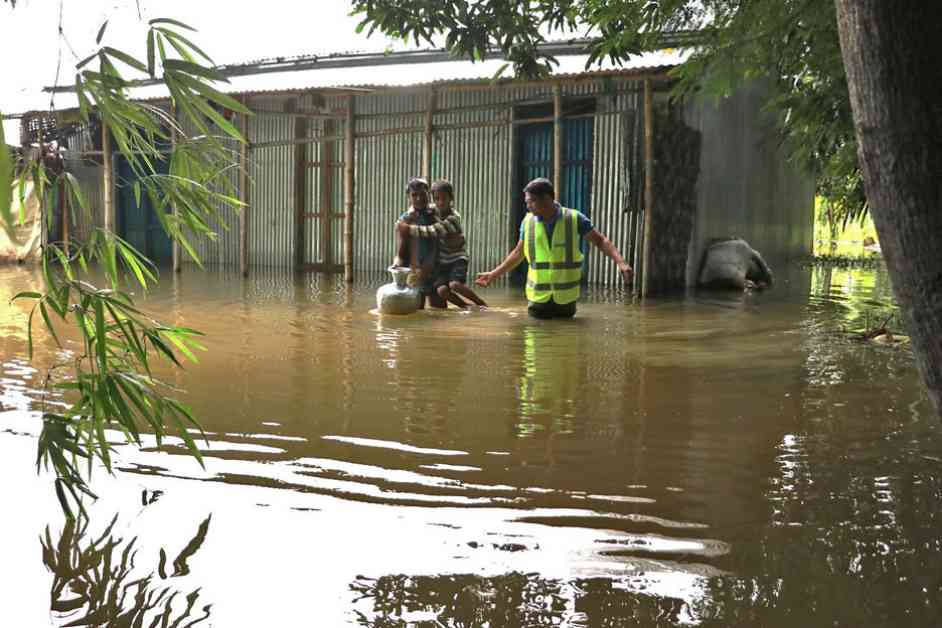In the wake of devastating floods in Bangladesh, SOS Children’s Villages have stepped up to provide much-needed aid to the millions affected by the natural disaster. According to reports from SOS Children’s Villages, 5.8 million people in Bangladesh have been impacted by the severe flooding, with over 2 million of them being children. The situation is particularly concerning for more than 1 million children and adults who are trapped by the rising waters, unable to access essential supplies and assistance.
Enamul Haque, the head of SOS Children’s Villages in Bangladesh, expressed deep concern for the affected population, stating, „Many areas are completely cut off, making it impossible to deliver urgently needed relief supplies.“ The organization is working tirelessly to reach those in need and provide essential support in the form of clean drinking water, food, medical care, shelter, and sanitation facilities. Additionally, there is a focus on creating safe spaces for children, protecting them from abuse and exploitation, and offering psychosocial support to help them cope with the trauma of the disaster.
The flooding in Bangladesh was triggered by heavy rainfall and a flood surge in the eastern part of the country, forcing over 500,000 people to seek refuge in more than 3,400 emergency shelters. Haque emphasized the critical need for immediate assistance, highlighting the importance of addressing the basic necessities of the affected population. He also pointed out the long-term implications of the climate crisis, attributing the recurrent flooding to climate change and its devastating effects on vulnerable communities.
Haque underscored the urgent need for global solidarity in combating the impacts of climate change and safeguarding the future of children in Bangladesh and beyond. He emphasized the role of collective action in halting the destructive consequences of environmental degradation and ensuring a secure environment for children to thrive.
Challenges Faced by Flood Victims
The aftermath of the floods has presented numerous challenges for the affected individuals and communities in Bangladesh. The destruction of homes, crops, and infrastructure has left many families without shelter, food, or livelihoods, exacerbating their vulnerability in the face of the ongoing crisis. The lack of access to clean water and sanitation facilities has heightened the risk of waterborne diseases and other health concerns, further compounding the dire situation.
Moreover, the displacement and separation of families have taken a toll on the emotional well-being of children and adults, leaving them traumatized and in need of support. The loss of loved ones and the disruption of daily life have added to the already immense burden borne by the flood victims, requiring comprehensive assistance to address their immediate and long-term needs.
The impact of the floods on children, in particular, has been profound, with many facing the risk of exploitation, abuse, and neglect in the chaos of the disaster. The disruption of education and social services has further marginalized vulnerable children, denying them access to essential resources and opportunities for growth and development. It is imperative to prioritize the protection and well-being of children in the response efforts to ensure their safety and security in the wake of the crisis.
SOS Children’s Villages: A Beacon of Hope
Amidst the devastation and despair caused by the floods, SOS Children’s Villages have emerged as a beacon of hope for the affected population in Bangladesh. With decades of experience in supporting children and families in need, the organization has mobilized its resources and expertise to deliver vital aid and assistance to those impacted by the disaster.
SOS Children’s Villages are providing a range of services to address the immediate needs of flood victims, including the distribution of food, water, and hygiene kits, as well as the provision of medical care and psychosocial support. The organization is also working to reunite separated families, protect children from harm, and create safe spaces where they can receive care and support during this challenging time.
In addition to its emergency response efforts, SOS Children’s Villages are committed to long-term recovery and resilience-building initiatives to help communities rebuild and recover from the devastation of the floods. By providing children with a stable and nurturing environment, the organization aims to empower them to overcome adversity and thrive in the face of adversity.
Call to Action: Addressing the Climate Crisis
The recurring floods in Bangladesh serve as a stark reminder of the urgent need to address the underlying causes of the climate crisis and its devastating impact on vulnerable communities. As one of the countries most affected by climate change, Bangladesh is experiencing escalating risks and challenges that threaten the lives and livelihoods of its population, particularly children.
Enamul Haque emphasized the importance of collective action in tackling the climate crisis and protecting the future of children in Bangladesh and beyond. He called on the global community to come together to mitigate the effects of climate change, preserve the planet’s resources, and create a sustainable future for all. By working together, we can build a more resilient and secure world for future generations.
In conclusion, the floods in Bangladesh have underscored the need for coordinated and comprehensive response efforts to address the immediate and long-term needs of the affected population. SOS Children’s Villages are playing a crucial role in providing aid and support to those impacted by the disaster, but more needs to be done to ensure the safety and well-being of children and families in the face of the climate crisis. It is imperative that we take decisive action to address the root causes of the environmental degradation and protect the most vulnerable members of society from the devastating effects of natural disasters.















